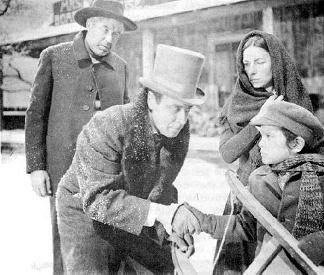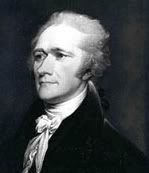Friday, March 10, 2006
THE AMERICAN
By Stockton
It may be the most ambiguous scene ever filmed. It is assuredly one of the most ambiguous scenes ever filmed.
A mother stands at the window of a Colorado cabin/boarding house and watches her young son play in the snow.* We see the interior of the home. A disheveled man, the father, is present, as is the figure of Thatcher, dressed like an exile from a Dickens movie.The father does not understand why his son can't stay and be raised in Colorado. The mother (Agnes Moorehead of Bewitched fame) proceeds to sign her child away to Thatcher and his Chicago bank, who will now be the child's guardian. You see, the mother has inherited a gold mine and does not wants her son raised in Colorado.
Thatcher is anxious to leave. The mother tells him she's had the child's trunk packed for a week. She doesn't cry. Perhaps she chokes-up. It's difficult to say.
When Charles is told about Chicago and Thatcher, he attacks the banker. The father is about to punish the boy when the mother tells us that she doesn't want the father to raise the boy.The boy will be raised far away, where the father can't get at him.

Charles Foster Kane is sent to Chicago to be raised, educated and to be far away from his abusive father. It's all clean and neat. Except....
Except when you watch the scene, there's a nagging doubt. Is the mother selling her son?
Something is wrong. She has had his trunk packed for a week when most mother's would put off such a trying task. She is cold, this Mrs. Kane. We wonder why she doesn't go with Charles. She is certainly wealthy enough to set-up home anywhere (she was left the gold mine, not her husband)Why isn't that possible? No one ever says.
The "abusive" father is far less threatening than the wife's cryptic comments suggest. He's clearly the weaker partner in this marriage and meekly succumbs when castigated by Mrs. Kane. His threat to punish Charles for attacking Thatcher is not outrageous, not for 1865 Colorado nor for audiences in 1941. He calls his son "Charlie", a far more endearing name than the cold "Charles" used by the mother in her icy tones. Mr. Kane wants "Charlie" to stay. He wants to raise "Charlie" while it is the mother's decision to exile "Charles" from the family.
Mrs. Kane packed the boy's trunk early: because she wanted to complete a painful task? Because it simply needed to be done? She doesn't cry but almost does. She doesn't say she'll go with him, even though the boy asks if she'll be traveling with him. She doesn't say there will be visits. We know there will be none.
The boy has been orphaned by one quick signature. He becomes Charles Foster Kane, who will later destroy every relationship he ever has. This is the key moment in one of the greatest movies ever produced.
There are other moments in Citizen Kane, many actually, that combine to make the film a classic in every sense of the word. I'll be discussing those scenes, the film and it's enigmatic director and star periodically.
If you enjoy movies, I hope you enjoy these posts.
*If you do not listen closely, it's easily missed. As young Charles Kane throws snowballs he shouts, "the Union forever!" The character is obviously referencing the Civil War. The writers, on the other hand, were probably enjoying a dig at corporate America.
It may be the most ambiguous scene ever filmed. It is assuredly one of the most ambiguous scenes ever filmed.
A mother stands at the window of a Colorado cabin/boarding house and watches her young son play in the snow.* We see the interior of the home. A disheveled man, the father, is present, as is the figure of Thatcher, dressed like an exile from a Dickens movie.The father does not understand why his son can't stay and be raised in Colorado. The mother (Agnes Moorehead of Bewitched fame) proceeds to sign her child away to Thatcher and his Chicago bank, who will now be the child's guardian. You see, the mother has inherited a gold mine and does not wants her son raised in Colorado.
Thatcher is anxious to leave. The mother tells him she's had the child's trunk packed for a week. She doesn't cry. Perhaps she chokes-up. It's difficult to say.
When Charles is told about Chicago and Thatcher, he attacks the banker. The father is about to punish the boy when the mother tells us that she doesn't want the father to raise the boy.The boy will be raised far away, where the father can't get at him.

Charles Foster Kane is sent to Chicago to be raised, educated and to be far away from his abusive father. It's all clean and neat. Except....
Except when you watch the scene, there's a nagging doubt. Is the mother selling her son?
Something is wrong. She has had his trunk packed for a week when most mother's would put off such a trying task. She is cold, this Mrs. Kane. We wonder why she doesn't go with Charles. She is certainly wealthy enough to set-up home anywhere (she was left the gold mine, not her husband)Why isn't that possible? No one ever says.
The "abusive" father is far less threatening than the wife's cryptic comments suggest. He's clearly the weaker partner in this marriage and meekly succumbs when castigated by Mrs. Kane. His threat to punish Charles for attacking Thatcher is not outrageous, not for 1865 Colorado nor for audiences in 1941. He calls his son "Charlie", a far more endearing name than the cold "Charles" used by the mother in her icy tones. Mr. Kane wants "Charlie" to stay. He wants to raise "Charlie" while it is the mother's decision to exile "Charles" from the family.
Mrs. Kane packed the boy's trunk early: because she wanted to complete a painful task? Because it simply needed to be done? She doesn't cry but almost does. She doesn't say she'll go with him, even though the boy asks if she'll be traveling with him. She doesn't say there will be visits. We know there will be none.
The boy has been orphaned by one quick signature. He becomes Charles Foster Kane, who will later destroy every relationship he ever has. This is the key moment in one of the greatest movies ever produced.
There are other moments in Citizen Kane, many actually, that combine to make the film a classic in every sense of the word. I'll be discussing those scenes, the film and it's enigmatic director and star periodically.
If you enjoy movies, I hope you enjoy these posts.
*If you do not listen closely, it's easily missed. As young Charles Kane throws snowballs he shouts, "the Union forever!" The character is obviously referencing the Civil War. The writers, on the other hand, were probably enjoying a dig at corporate America.


